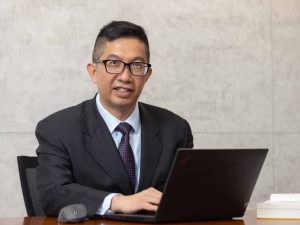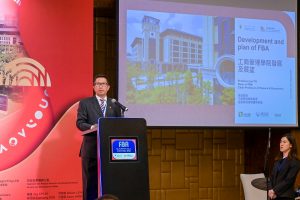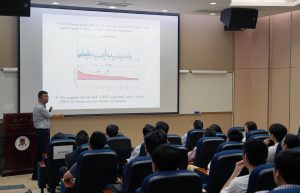Prof Yu Jun is an internationally renowned expert of financial econometrics. Collaborating with scholars from the US and Australia, he has developed a tool to measure exuberance in financial markets. This tool has been widely adopted across countries and regions in the US, Europe, and Asia, serving as a valuable resource for identifying financial crises and asset bubbles, as well as informing economic policies.
Having dedicated more than 30 years to pursuing academic knowledge and building his academic career abroad, Prof Yu now serves as the dean of the Faculty of Business Administration (FBA) at the University of Macau (UM). He is also appointed as the University of Macau Development Foundation Chair Professor of Finance and Economics. With his extensive global academic knowledge and experience, Prof Yu is committed to leading FBA to new heights and enhancing the synergy between teaching and research to nurture talent.
The new dean’s plans for FBA
Although Prof Yu has only recently become the FBA dean, he has already developed a comprehensive plan for the faculty’s development. Prior to joining UM, he held the position of Lee Kong Chian Professor of Economics and Finance at Singapore Management University. Prof Yu’s association with UM began in 2015 when he was invited to deliver a speech at the university shortly after its relocation to the current Hengqin campus. Since then, he served numerous times as an external panel member for UM academic staff recruitment. This decade-long engagement has given him a front-row seat to the university’s development and progress. In preparation for his new role at UM, Prof Yu began frequent travel from Singapore to Macao several months before officially assuming his position. During this period, he had meetings with more than a hundred university stakeholders to familiarise himself with the faculty operations and plan for the enhancement of its teaching and research quality.
Soon after taking up his role at UM, Prof Yu attended the first FBA alumni gala dinner as the dean. In a hall filled with distinguished alumni and faculty members, he delivered a speech where he discussed the past, present, and future of FBA. He also celebrated faculty achievements over the past 30 years with the alumni. In addition, Prof Yu unveiled a development blueprint and outlined strategic plans for the future of FBA. He emphasises, ‘Through the collective efforts of students, faculty, staff, and alumni, FBA has made significant achievements. Building on this foundation, we will continue to foster knowledge innovation and promote the synergy between teaching and research.’
With full confidence in his new position, Prof Yu’s priority is to further enhance the research quality of the entire faculty and the research abilities of doctoral students, which he considers crucial for FBA to enhance its international reputation. Prof Yu intends to start with postgraduate education and he will encourage faculty members to strengthen their interactions with master’s and doctoral students to cultivate a research-focused atmosphere. He also plans to introduce high-quality research methods across various business disciplines, while enhancing the disciplinary design and academic offerings of the faculty to elevate the teaching quality.
Working hard to acquire knowledge
With a strong interest in mathematics since a young age, Prof Yu participated in multiple mathematical Olympiads during his secondary school years. He was later admitted to the Department of Mathematics at Wuhan University. Recognising the vast knowledge he had yet to acquire, Prof Yu dedicated an entire summer during his second year to reading in the library. One of the books he delved into was the Chinese book A Study of Modern Western Economic Theories (現代西方經濟學概論) by Prof Li Yining and Prof Qin Wanshun from Peking University. This textbook opened Prof Yu’s eyes to the world of applied mathematics and economics, because through this book he discovered how economic concepts could be expressed mathematically and how mathematical tools could elucidate the economic logic. Driven by his newfound passion for economics, Prof Yu took additional economics courses every semester, leading to an unexpected outcome. ‘Wuhan University was running an academic credit system at that time. It wasn’t until my graduation that I realised I had accumulated enough credits for two bachelor’s degrees—one in mathematics and one in economics,’ Prof Yu recalls.
Prof Yu’s dual degrees in mathematics and economics established him as an interdisciplinary talent. Moreover, his diligent work during his undergraduate years laid a robust foundation for his subsequent studies abroad and his future contributions to research.
Developing the ‘thermometer’ for financial bubbles
Aspiring to make further contributions following his academic success, Prof Yu began leveraging his expertise in mathematics and statistics to analyse economic phenomena. In 2005, he collaborated with Prof Peter Phillips and Prof Yangru Wu on metric research about financial crises. These three economists, together with scholars from the US and Australia, developed a novel method to detect asset bubbles and predict the timing of financial bubbles and crises. This innovative method is now regarded as the ‘thermometer’ for financial bubbles.
The metric study was completed in 2007, during a period of global economic prosperity, and the team began submitting their paper to academic journals. However, Prof Yu recalls that the process was fraught with challenges, as the paper faced consistent rejections. While they were contemplating how to convince journal editorial boards of the paper’s significance, a financial tsunami swept the world in 2008. This event suddenly thrust their study into the spotlight, capturing the attention of major financial institutions including the Federal Reserve Bank of the US, the US Department of the Treasury, the People’s Bank of China, the Deutsche Bundesbank, the Bank of Canada, and the Hong Kong Monetary Authority. Subsequently, the scholars started a series of studies on the stochastic fluctuations and continuous time models of financial markets, which garnered high citation rates and became crucial references in economic policymaking across various countries and regions in the US, Europe, and Asia.
Prof Yu says, ‘It is normal to face rejection in academia. Only high-quality research can withstand the test of time.’ Given the complexity and unpredictability of financial markets, Prof Yu’s team continuously refines the ‘thermometer’ to ensure its effectiveness in helping financial regulatory agencies monitor economic overheating. This enables governments to implement timely economic policies to reduce the possibility of financial bubbles. Currently at UM, Prof Yu is also collaborating with Zu Yang, associate professor in the Faculty of Social Sciences, to enhance the accuracy of the ‘thermometer’ by integrating regional market variables and data.
From seeking knowledge to generating knowledge
Reflecting on his career as a researcher, Prof Yu attributed his accomplishments to his intellectual curiosity. He believes that only by having a deep understanding of their fields can researchers identify intriguing questions. In view of this, Prof Yu endeavours to stimulate students’ thirst for knowledge in his teaching. He ensures that students are provided with sufficient academic resources and encourages them to be proactive in their pursuit of knowledge. In addition, he advocates the use of scientific research methods.
Now serving as the UM dean of FBA, Prof Yu plans to leverage his successful teaching and research experience from Singapore Management University to cultivate a vibrant research atmosphere in the faculty. When he joined Singapore Management University in 2004, shortly after its establishment, he was tasked with developing a doctoral training system for the university. To achieve this, he organised regular group research meetings where he engaged in in-depth discussions with doctoral students about the nature of research questions, objectives, and methodologies. This approach not only ensured the quality of research outcomes but also led to the production of high-quality papers during his tenure, many of which were subsequently published in international academic journals.
Prof Yu explains, ‘It is the mission of teachers to inspire students to seek and explore knowledge. FBA will fully collaborate with faculty members to enhance students’ critical thinking and research skills, thereby elevating the quality and depth of their research papers.’
Seizing development opportunities
After completing his bachelor’s studies in China, Prof Yu spent more than 30 years pursuing his international academic career, from Canada to New Zealand, and then to Singapore. Looking ahead, he plans to use his broad international perspective to lead the development of FBA. He highlights that the educational standards of FBA align with international benchmarks. The faculty maintains robust collaborations with nearly a hundred academic institutions and enterprises worldwide. Moreover, FBA is the only business school in Macao accredited by the Association to Advance Collegiate Schools of Business, the Association of MBAs, and the European Foundation for Management Development, showcasing its outstanding international academic credentials.
In recent years, in response to the development of new technologies and their business applications, FBA has optimised its academic offerings by incorporating both traditional and emerging business fields. The faculty also maintains ongoing industry communication to ensure the curriculum is up-to-date to meet evolving talent development needs. Prof Yu believes that in the face of globalisation and the rapid development of digital technology, future financial and business professionals must possess a spirit of continual innovation to tackle the challenges posed by international competition and new technologies.
Looking forward, Prof Yu says that FBA will capitalise on its strong foundation to advance teaching, research, and community services. The faculty will seize new development opportunities and contribute to future teaching initiatives in the Guangdong-Macao In-Depth Cooperation Zone in Hengqin. He says, ‘We will leverage our distinct research characteristics and strengths to further refine our academic system. Moreover, by cultivating high-end talent and conducting high-quality academic research, we are committed to promoting the diversification of Macao’s economy and supporting the sustainable development of the nation’s industries.’
Profile of Prof Yu Jun:
Prof Yu Jun is dean of the Faculty of Business Administration and Chair Professor in the Department of Finance and Business Economics at the University of Macau. He is also appointed as the University of Macau Development Foundation Chair Professor of Finance and Economics. With more than 20 years of teaching and research experience, Prof Yu has held academic positions in universities in Canada, Singapore, and mainland China. As an expert in financial markets, financial econometrics, and asset pricing, Prof Yu has published nearly a hundred papers in top-tier international journals, including Review of Financial Studies, Journal of Econometrics, Management Science, and International Economic Review.
According to Google Scholar, Prof Yu’s papers have been citied more than 10,000 times. In addition, he is an associate editor for prestigious international journals such as Journal of Econometrics and Econometric Theory. In 2020, he co-authored the textbook Financial Econometric Modeling with Stan Hurn, Vance Martin, and Peter Phillips, which was published by Oxford University Press.
Over the years, Prof Yu has dedicated himself to applying theories and methods for detecting financial bubbles in real-life scenarios. With his expertise, he has served as a consultant for numerous central banks, international organisations, and large companies, including the International Monetary Fund, the Hong Kong Monetary Authority, the Monetary Authority of Singapore, the Government of Singapore Investment Corporation, the Ministry of National Development of Singapore, the Reserve Bank of New Zealand, and the New Zealand Treasury.
Text: Kelvin U
English translation: Bess Che
Photos: Jack Ho
Source: My UM Issue 133



